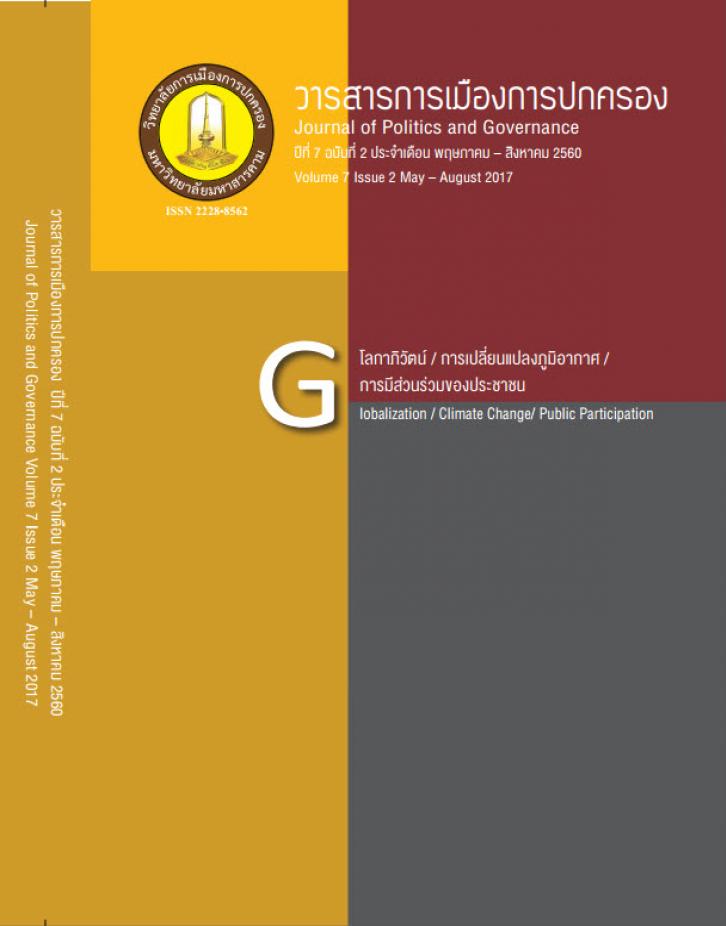Legal Problems of the price decreasing for the remaining land of the Immovable Property Expropriation Act B.E. 2530
Main Article Content
Abstract
The purpose of this thesis is to study the history and relation of legal problems of the agency’s legal authority on imposing compensate determination for the land that remains after the plot of land been expropriated. Due to the complication of problems in legal practice, this research focuses on the problem in legal in case of a partial expropriation and it causes the price of remaining go down low the compensate determination has to also cover that remaining.
From the study, the researcher founded that the fair regulations of compensate for the expropriation immovable property must be comprehensive, including compensate expropriation immovable property, compensate for remaining land, and other damage due to expropriation, especially compensate for the price decreasing of that remaining. The authorities must impose fair compensation for the expropriation remaining land, the damage, disadvantages or limited land use of the remainder due to expropriation, by taking consideration of the public and related parties. The government must employ the government budget gained from the public tax efficiently, in order to accomplish the aims of the expropriation in public interest and in order that the owner of the immovable property to be expropriated receive fair and suitable compensation.The comprehensive regulations or timely legal practice in composing determining the compensation will bring about fair practice for the owner of immovable property that lose interest from expropriation and the public. Due to the current legal regulations on determining the compensation for the remaining land during the period of study cannot compensate the damage to expropriation remaining in case that the owner of immovable property cannot make use of the remaining land, the researcher would like to propose that the regulations on the compensation for the remaining in price decreasing should be imposed, and the laws related to expropriation should be revised, so that the enforcement of authority units in purchasing or expropriation that remaining and the owner of immovable property cannot make use of the land according to the previous purposes, and so that the government could make use of land to purchasing or expropriation for other public utility.
Article Details
References
เชื้อ คงคากุล. (2501). ความรู้เบื้องต้นเกี่ยวกับกฎหมายทั่วไป. กรุงเทพฯ:คำบรรยายกฎหมาย มหาวิทยาลัยธรรมศาสตร์.
บรรเจิด สิงคะเนติ. (2555). หลักพื้นฐานเกี่ยวกับสิทธิเสรีภาพและศักดิ์ศรีความเป็นมนุษย์. กรุงเทพฯ:สำนักพิมพ์วิญญูชน.
บรรเจิด สิงคะเนติ. (2554). หลักกฎหมายเกี่ยวกับการควบคุมฝ่ายปกครอง. กรุงเทพฯ:สำนักพิมพ์วิญญูชน.
วรเจตน์ ภาคีรัตน์. (2555). กฎหมายปกครองเปรียบเทียบความรับผิดของรัฐในระบบกฎหมายเยอรมัน ฝรั่งเศส และอังกฤษ. กรุงเทพฯ:มหาวิทยาลัยธรรมศาสตร์.
นันทวัฒน์ บรมานันท์. (2550). สัญญาทางปกครอง. กรุงเทพฯ: สำนักพิมพ์วิญญูชน.
นันทวัฒน์ บรมานันท์.( 2557). กฎหมายปกครอง. กรุงเทพฯ:สานักพิมพ์วิญญูชน.
ศุนันท์กรณ์ (จำปี) โสตถิพันธุ์. (2553). คำอธิบายกฎหมายลักษณะละเมิด จัดการงานนอกสั่งลาภมิ ควรได้. กรุงเทพฯ: สำนักพิมพ์วิญญูชน.
นัฐกานต์ ขำยัง. (2550). ค่าทดแทนที่เป็นธรรมตามกฎหมายว่าด้วยการเวนคืนอสังหาริมทรัพย์. วิทยานิพนธ์มหาบัณฑิต คณะนิติศาสตร์ มหาวิทยาลัยธรรมศาสตร์.
วรพจน์ วิศรุตพิชญ์. (2538). หลักการพื้นฐานของกฎหมายปกครอง.กรุงเทพฯ: โครงการตำราและเอกสารประกอบการสอน คณะนิติศาสตร์ มหาวิทยาลัยธรรมศาสตร์.
บันทึกตอบข้อหารือสำนักงานคณะกรรมการกฤษฎีกาเกี่ยวกับเรื่อง กระบวนการเวนคืนและการ กำหนดค่าทดแทน.
พระราชบัญญัติว่าด้วยการเวนคืนอสังหาริมทรัพย์ พ.ศ.2530(ฉบับอ้างอิง). สำนักงานคณะกรรมการกฤษฎีกา.


